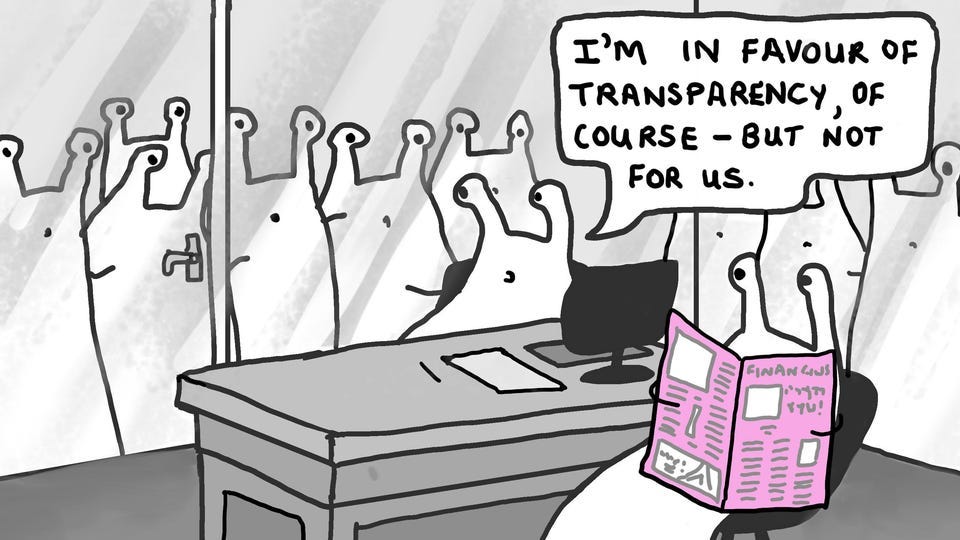The People Who Run Finance Want Decentralised Finance
It's not about libertarianism, it's about money.
Dateline: Woking, 15th April 2023.
The CEO of Blackrock, Larry Fink, recently said that tokenisation will be "the next generation for markets”. If you think of tokens as Bitcoin or as pictures of chimpanzees with sunglasses on, you probably think that the man who runs the biggest asset management company (with $7 trillion under management) is out on a limb. But if you think of tokens as digital assets that can be traded via protocols, you may well agree with me that his view is accurate, credible and inevitable.
It may sound hyperbolic, but the future will be tokenised.
Love or Money?
Mr. Fink’s perspective is not, I am sure, born from a love of West Coast pseudo-libertarianism or a desire to smash the state and return society to primal state of warlords and peasants. Quite the contrary, in fact. His view of a new kind of financial market infrastructure of fungible and non-fungible tokens that are exchanged through decentralised financial services will provide “instantaneous settlement” and “reduced fees”. Token are bearer instruments. The token for $100 or for a seat at a Rangers game is either in my wallet, in which case it is mine, or it is your wallet, in which case it is yours. When a token goes from my wallet to your wallet it is now yours. There is no clearing or settlement, no reconciliation and no question of authenticity.
The idea that tokens are central to the future of finance is not new to other serious players who understand financial markets. I interviewed Jonathan Larsen (as head of the Ping A Global Voyager Fund) on stage at Money20/20 Asia in Singapore five years ago and he told me then that tokenisation in finance is “a much bigger story than cryptocurrencies" and confirmed my suspicion that institutional strategies and scenario plans should be updated to take into account the new technology immediately. I remember Jonathan's focus on three key characteristics that he saw as driving the new asset class:
Transparency;
Universal access; and
The ability to reduce "frictional costs".
Reducing frictional costs, thus reducing the overall cost of financial intermediation in society, is a good thing for all of us. But in my view that point about transparency is also critical to the next evolutionary era of financial services.
Last year the CEO of Goldman Sachs, David Solomon, who was similarly talking about using decentralised finance to reduce risk in the financial system also said that the technology was about making the financial system more transparent and the St. Louis Fed, in their report on Decentralised Finance, similarly described an infrastructure based on open protocols, with agreements that are enforced by code and transactions that are executed in a secure and verifiable way. They predict that such an infrastructure in a highly interoperable financial system with "unprecedented transparency, equal access rights and little need for custodians, central clearing houses, or escrow services."
The Defi Wins
The Bank for International Settlements (BIS) recently produced a paper on the technology of decentralised finance (Working Paper no. 1066, January 2023) which looked in some detail at why the financial sector should take it seriously.
First, because defi harnesses innovative technology that is important way beyond its origins in cryptocurrency, specifically the algorithmic automation of financial activity which supports the pooling of assets of small and large-scale actors alike.
Secondly, it enables a new and competitive type of financial engineering around composition, the ability to combine the functions of multiple defi protocols to offer “novel, complex, and deeply nested” financial products without being dependent on any single intermediary.
Finally, and related to the previous aspects, the BIS sees DeFi as a “blueprint” of how technology can enable new forms of openness to the financial sector that can add stability and scale for finance ecosystems.
Again, that point about transparency resonates strongly for me. Note, however, that transparent does not mean that everyone will be able to read everyone else’s data: But it does mean that the new technologies will enable everyone to see that they can trust everyone else, the financial markets version of the difference between showing people your date of birth (bad) and showing people a credential from a regulated financial institution that states that you are over 21 (good).
You can prove things about data without sharing the data, a concept I keep returning to because it is so central to both the universe and the metaverse.
Smart Markets
Larry, Jonathan, David and the St. Louis fed are people who have forgotten more about financial services than I will ever learn, so I think I need to take their points about transparency on board and start thinking about how the emerging regulatory environment for digital assets can be different from, and more efficient than, the existing regulatory environment.
That is to say that using the techniques of cryptographic blinding, verifiable credentials, homomorphic encryption and so on we can make markets that work in a very new way. We can make smart markets in which, for example, organisations can be sure of the solvency of counterparties by computing that their assets exceed their liabilities without being able to discover what any of those assets or liabilities actually are.
No need for meaningless “attestations” or after-the-horse-has-bolted audits: Financial markets that are built on the pillars of tokens, transparency and trust will indeed be the next generation.
Are you looking for:
A speaker/moderator for your online or in person event?
Written content or contribution for your publication?
A trusted advisor for your company’s board?
Some comment on the latest digital financial services news/media?





Good post Dave. My perspective is a tad different. Existing financial players want to revamp their bank end infrastructure to look more like DeFi.. but not in public blockchains.. but rather private chains with controlled counterparties. This is why we see IBM investing so heavily in hyperledger fabric. They are building it now. As with any technology revolution, the first user of any new tech are existing participants, as they seek to create competitive advantage.